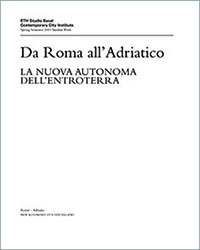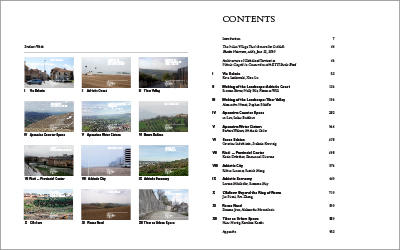Rome to Adriatic - New Autonomy of a Hinterland

Professors: Roger Diener, Marcel Meili
Assistants: Mathias Gunz, Rolf Jenni, Milica Topalovic, Christian Müller Inderbitzin
Collaborators: Gabriele Mastrigli, School of Architecture and Design, Ascoli Piceno (Unicam); Pippo Ciorra, School of Architecture and Design, Ascoli Piceno (Unicam); Francesco Garofalo, Architecture Faculty, G. d´Annunzio University, Pescara; Massimo Angrilli, Environment, Network, Territory Department, G. d´Annunzio University, Pescara; Giovanni Caudo, Faculty of Architecture, Roma Tre University; Luca Montuori, Faculty of Architecture, Roma Tre University; Carlo Cellamare, Department of Architecture and Town Planning, University of Rome “La Sapienza”; Antonella Perin, Architect, Urbanist, Rome
Graphic Designer: Absolut Agentur, St. Gallen
Editorial Supervisors: Mathias Gunz, Christian Mueller Inderbitzin, Vesna Jovanovic
Editorial Assistant: Stephanie Winter
Druckerei Weber GmbH & Co., Lörrach.
Published by ETH Studio Basel: Contemporary City Institute, Basel 2015

Via Salaria is an ancient Roman consular road connecting the Imperial city Rome to its territory. Along its path through the Apennine and down to the Adriatic Sea one can find a series of urban configurations. Historically defined by its relationship to Rome they have taken different path, some – although rural in appearance – becoming integral parts of Rome’s infrastructure, others drifting into oblivion; again others manage to reinvent themselves within the now omnipresent global networks thus becoming largely independent of Rome and establishing a new autonomy of the hinterland. ETH Studio Basel, after researching the transformation processes of contemporary cities under globalization pressures, has started a series of territorial investigations to learn more about the impact of these forces on the territory beyond the clear gravitational fields of metropolitan centers. For this we ventured to Central Italy for a two-week expedition, moving along the old consular road Via Salaria, from Rome and Roman Campagna, to the Apennine nature parks and to the emerging continuous metropolis along the Adriatic Coast.

